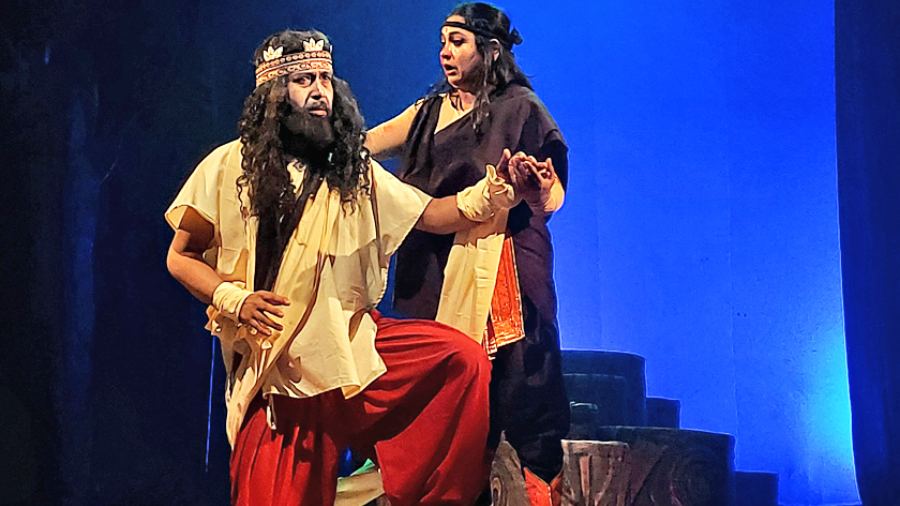Kuntal Mukhopadhyay, a sociologist by profession and a playwright-director by passion, turned heads when Sanglap Kolkata produced Shudrayan in 1998. Taking a hint from Kamban’s Ramayana and delving deep into the socio-anthropological past of the Godavari river basin, Shudrayan was successful in expanding the Marxist interpretation of Rama’s journey down south with imperial motives backed by the Brahminical order. It put Mareecha, an intellectual aspiring for knowledge, at the centre of action. His tense relationship with Shurpanakha, the tribal princess, and the changing dynamics of the predominantly tribal lower-Vindhya region ever since Rama and his men set camps, formed the backbone of the play. When Berhampore-based Ritwik, with its commitment to socially relevant theatre spanning over four decades, decided to produce Shudrayan, expectations soared.
Watching the March 27 premiere at Rabindra Sadan, Berhampore, was a reassuring experience. Directed by Mohit Bandhu Adhikary, this spectacular production, running close to two hours, aims to look at our mythological past in the light of racial conflicts. Apart from underplaying the comic interludes that Mukhopadhyay employs so effectively, Adhikary does not meddle with the original text. Bringing in two female narrators (Meghamita Chakraborty and Subnaj Rahaman) to pinpoint the ethnic issues that resonated in Anna Vau Sathe’s passionate lines, with a subtle eco-feminist note, is a welcome move. Adhikary chose a recorded version of “The Internationale” to round off his socialist take. The ploy worked, mostly.
Chinmoy Chakraborty’s multi-functional set was put to good use. But the light designed by Shyamaprasad Bandyopadhyay, underlined by the blue projection on the cyclorama, was an eyesore. The costumes — a heady blend of period designs and contemporary textures — displayed little research. Swapan Bandyopadhyay’s background score, a major component in period dramas, did not have a single jarring note. Ritwik worked really hard to mount this ambitious project. The upper register in vocal delivery fit the classical tempo. Biplab Dey, playing Mareecha, and Mahuya Chakraborty, playing Shurpanakha, held forth with competent portrayals. Sahanaj Begum, playing Janaki, displayed flashes of brilliance.










